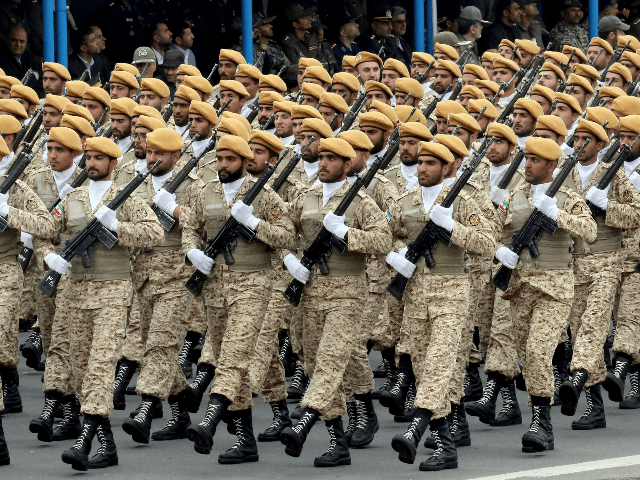Iran’s “growing” military might has frightened enemies and served as a deterrent for Tehran’s foes, the deputy commander of the Islamic Revolutionary Guard Corps (IRGC) indicated on Thursday amid skyrocketing tensions between the Iranian regime and the United States, the semi-official Tasnim News Agency reported.
Citing a separate Tasnim article published Thursday, Reuters adds that Iran also cautioned the U.S. of a “stronger” reaction if it violates its borders.
The warning came a week after the Islamic Republic shot down an American drone, claiming it had violated its airspace, which the United States denied.
In recent days, Iran has also demanded that the United States pull out its military troops from the Persian Gulf region, a position consistent with that of Tehran-allied Shiite militias in Iraq that have repeatedly threatened to force the U.S. out of the area.
Iran’s decision to bring down the American drone has exacerbated the already tense relations between Washington and Tehran, fueled mainly by the unprecedented wave of sanctions U.S. President Donald Trump’s administration has imposed on the Shiite regime.
On Thursday, IRGC Rear Adm. Ali Fadavi boasted that “Iran’s growing military power has prevented the enemies from taking any military action against the Islamic Republic,” according to Tasnim.
Fadavi indicated that “while hard threats continue to exist, nobody has dared to fire a bullet at the Islamic Republic ever since the end of the Iraqi imposed war on Iran 30 years ago,” the semi-official news agency notes.
On Wednesday, the Islamic Republic’s parliament speaker Ali Larijani reportedly threatened a stronger reaction if the United States enters its territory.
“The downing of their drone was a good experience for them to avoid any aggression against our borders,” the top Iranian lawmaker proclaimed on Wednesday.
“Iran’s reaction will be stronger if they repeat their mistake of violating our borders,” Larijani added.
Brian Hook, the U.S. special representative for Iran, told lawmakers last week that the American sanctions are “working,” noting that the restrictions have made it difficult for Iran to expand its military capabilities and continue funding its terrorist proxies.
“Today by nearly every metric the regime and its proxies are weaker than when our pressure began. … Our pressure campaign is working. It is making Iran’s violent and expansionist foreign policy cost prohibitive,” Hook told a House panel last week.
The United States, however, is not taking any chances and is preparing for conflict.
Asked if Iran is too broke for an all-out war with the United States, Cmdr. Rebecca Rebarich, a Pentagon spokeswoman, told Breitbart News, “I am not going to speculate.”
“U.S. policy has not changed,” she continued. “The president has been clear that he does not desire war with Iran, and wants to resolve differences through negotiations.”
“The Department of Defense has taken prudent steps to adjust its force posture in the Middle East to strengthen its defenses, dissuade Iran from attacking U.S. forces, and ensure the president has a range of options available in the event of further attacks,” she further noted.
Hook did warn lawmakers that Iran still poses a threat of asymmetrical warfare, which refers to unconventional strategies and tactics used by a force with lower capabilities than its rival.
“Iran still, even with very little revenue has asymmetric capabilities that terrorists have,” he said.
The U.S. has designated the IRGC a foreign terrorist organization. Iran has long been listed by the U.S. government as a state-sponsor of terrorism.
“It is the case that the regime has tens of millions of dollars of less revenue than what it did before our sanctions took effect. That does not mean we have eliminated their asymmetric threat,” Hook stressed.
Since May, President Trump has approved the deployment of military equipment and an additional 2,500 troops to the Middle East where the United States already has about 70,000 troops, including an estimated 5,200 next door to Iran in Iraq and about 2,000 in neighboring Syria.
President Trump’s May 2018 decision to pull the United States out of the 2015 controversial nuclear deal between Tehran and U.S.-led world powers escalated tensions between the two countries.
Angering Iran, Trump reimposed sanctions suspended under the pact as part of a historic series of restrictions against the regime intended to push the Islamic Republic into a different agreement. President Trump has repeatedly argued that the 2015 pact was not tough enough on Iran.
Reuters notes:
In reaction to Washington’s increasingly crippling sanctions, Tehran has quadrupled its production of uranium and said on Wednesday it will exceed limits, set by the nuclear deal, on its enrichment of uranium as of Thursday unless EU took steps to save the deal.
In an unprecedented step that has increased tensions, Trump on Monday targeted Iran’s top authority Supreme Leader Ayatollah Ali Khamenei and other senior Iranian officials with new U.S. sanctions. Iran has rejected the latest sanctions as an “idiotic” move.
Iran has repeatedly rejected U.S. offers for negotiations. Both countries have said they do not want to go to war, but will do so if necessary.
U.S. military officials have long warned against the presence of Iran and its narco-terrorist proxy Hezbollah in the Western Hemisphere, particularly in the United Sate’s back yard Latin America.

COMMENTS
Please let us know if you're having issues with commenting.